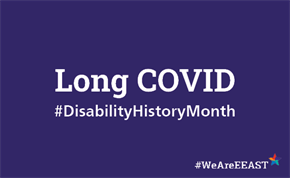
The final condition we are looking at this Disability History Month is long COVID.
What is long COVID?
Long COVID is a condition characterised by the persistence or development of symptoms attributed to COVID-19.
Most people with coronavirus will feel better within a few days or weeks of their first symptoms and make a full recovery within 12 weeks. For some people, these symptoms can last longer, which is called long COVID, or post COVID-19 syndrome.
Long COVID is a new condition which is still being studied, however, the most common symptoms are:
You can find out more about the condition, symptoms and treatment via the NHS website.
Living with long COVID
It is thought that around two million people in the UK are suffering with long COVID.
It is important to look after your wellbeing if you’re suffering from the condition, eating well, and getting enough sleep are important for helping you recover.
Living with a long-term condition such as long COVID can take its toll, so it's important to keep an eye on your mental wellbeing. If you are suffering from long COVID, it is important to look after yourself and your mental wellbeing. If you are finding areas in your life difficult, please make sure you speak to someone you trust and reach out for support.
Find out more about wellbeing support you can access at EEAST.
It is also essential you pace yourself with everyday tasks, as they may prove more challenging, leaving you breathless and tired, but please try to keep moving because staying active will help you with your recovery; for example, getting up from your chair and going for a short walk.
Find help and support with your COVID recovery using the online resource created by the NHS.
Long COVID as a disability
By law, a disability is defined as a physical or mental impairment that has a ‘long-term and substantial adverse effect’ on someone’s ability to carry out normal day-to-day activities.
‘Substantial and long-term’ means:
Although long COVID is a new illness, it is evident that the condition can affect someone’s everyday life and this can last for several months, or even years. Not only this, but the effects of long COVID can also cause other impairments.
If you’re struggling with long COVID, it’s important to speak to your manager or employer and see what reasonable adjustments can be made for you.
Past, present, future
As long COVID is a new condition, the general understanding is quite poor, and we will not know more until further research is carried out. The WHO are bringing the worlds scientists and professionals together to accelerate the research and development process to develop new norms and standards to contain the spread of the virus. Global research on coronavirus disease (COVID-19) (who.int)
Whilst there’s a lot for the medical world to learn about long COVID, research is a positive step in the right direction that it is now on the healthcare agenda and being recognised as a debilitating condition.
Treatments for long COVID can vary from person to person depending on your symptoms. You may be given advice to manage your symptoms at home, or, if your symptoms are having a big impact on your life, you may be referred to a rehabilitation service.
Hopefully moving forward, with the research being carried out, our understanding and treatment of the condition will be vastly improved.
Do you suffer from long COVID? Get in touch with your story, we would love to hear from you!
Published 8th December 2022